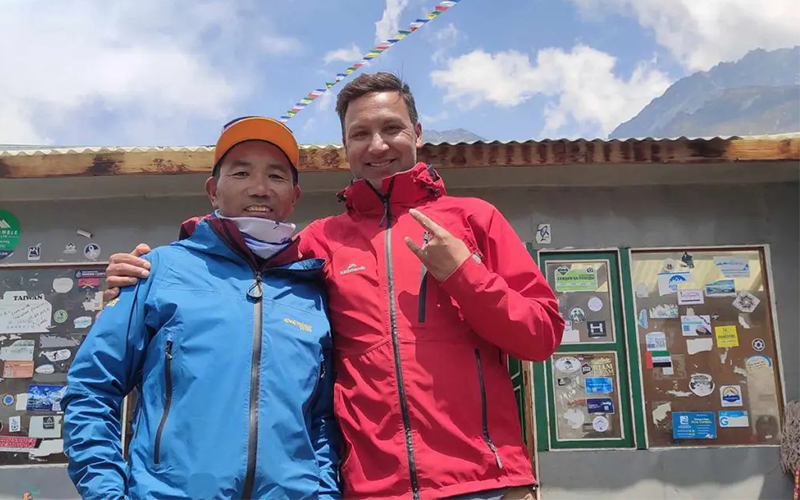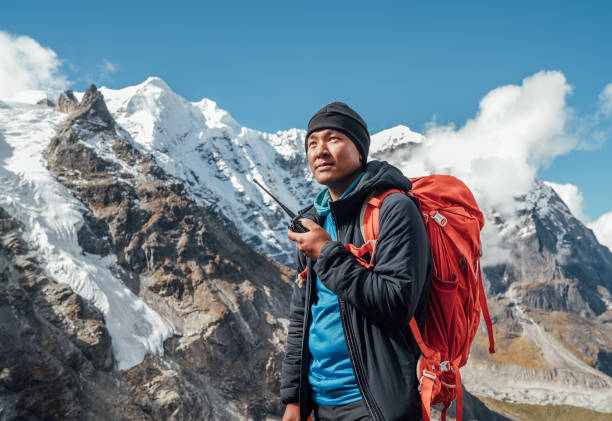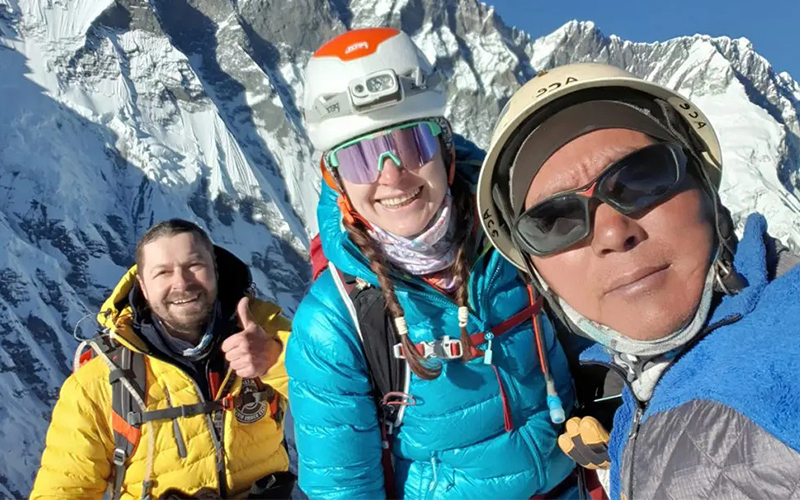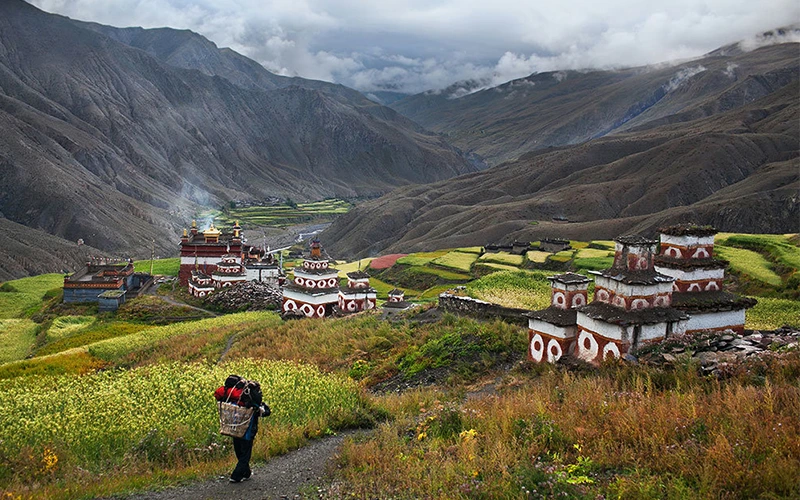Tour of Nepal- The Pillars of Everest Expeditions

Nepalese mountain guides are globally recognized as the backbone of successful Mount Everest expeditions. Through their profound expertise, many of which come from the Sherpa community, they blend ancient high-altitude survival practices with modern mountaineering techniques. Their unparalleled skill and dedication transform the dreams of countless climbers into reality, guiding them safely to the summit of the world’s tallest peak.
The Legacy of Nepalese Mountain Guides: A Rich History

The guiding community of Nepal is deeply intertwined with the history of Mount Everest. Since the legendary ascent by Tenzing Norgay and Sir Edmund Hillary in 1953, the Sherpas and other Nepali guides have led thousands of climbers to the summit. Their essential contribution to expeditions on Mount Everest is irreplaceable, combining both technical prowess and cultural reverence for the mountains. This legacy is a testament to the guides’ unwavering determination and their intimate connection with the Himalayas, which has made each successful summit possible.
Record-Breaking Feats: Nepalese Guides Leading the Charge
Among the most distinguished of Nepalese Everest guides are remarkable individuals who have set unprecedented records:
– Kami Rita Sherpa, who has summited Everest 26 times, holds the world record for the most successful ascents of Mount Everest.
– Pasang Lhamu Sherpa made history as the first Nepali woman to summit Everest, breaking barriers and inspiring a new generation of female climbers.
– Mingma Gyabu Sherpa holds the record for the fastest ascent from Base Camp, showcasing the physical endurance and technical prowess that define these guides.
Essential Skills of Nepali Guides: A Blend of Expertise and Tradition

Technical Expertise:
The skills required to guide climbers safely to the summit of Everest are vast and varied. From navigating the dangerous Khumbu Icefall to installing and maintaining fixed ropes, Nepali guides are equipped with a detailed understanding of the route and the mountain’s challenges. They are trained in high-altitude rescue operations, weather interpretation, and the management of base camps, making them indispensable to the success of any expedition.
Cultural Knowledge:
Beyond technical skill, Nepali guides offer a wealth of cultural knowledge. Their deep respect for the mountains, rooted in centuries of tradition and spiritual belief, enriches the climbing experience. Guides integrate local customs, history, and spiritual practices into their work, creating a more meaningful and responsible approach to mountaineering. This cultural connection helps foster a sense of environmental stewardship and respect for the heritage of the Himalayas.
Training and Certification: Excellence in Every Step

At Tour of Nepal, we ensure that our guides undergo rigorous training through the Nepal Mountaineering Association (NMA). This includes both basic and advanced mountaineering courses, high-altitude medicine, rescue techniques, and modern safety protocols. Additionally, training in client management skills ensures that each guide can effectively communicate and manage the diverse needs of climbers, ensuring safety and satisfaction throughout the expedition.
Guide Services and Responsibilities: Dedicated to Your Safety and Success
Pre-Expedition:
Before embarking on the journey, guides at Tour of Nepal conduct thorough equipment checks, plan the best possible route, monitor weather conditions, and assist in training and acclimatization. Their expertise in preparing climbers for the challenges of Everest is crucial for ensuring a smooth and safe ascent.
During Expedition:
Once the expedition is underway, the guides are responsible for safety management, route fixing, load carrying, camp setup, and emergency responses. Their leadership and constant vigilance guarantee that every climber remains secure throughout the journey, with clear communication at all stages.
Supporting Nepal’s Guiding Community: Strengthening Local Networks
The local guiding community in Nepal faces various challenges, but Tour of Nepal remains committed to supporting the guides’ welfare through:
– Fair compensation practices ensuring that guides are rewarded fairly for their hard work.
– Equipment investment that provides guides with the best tools for the job.
– Training opportunities to continually improve skills and ensure safety.
– Insurance coverage that offers guides a safety net in case of emergencies.
Additionally, our support extends to community development initiatives, such as guide welfare programs, family support systems, educational opportunities, and improved healthcare access, all of which enhance the lives of those dedicated to mountaineering in Nepal.
Choosing a Nepalese Guide: Ensuring the Best Experience

When selecting a guide for an Everest expedition, it’s essential to consider their:
– Experience level, including their history of summiting Everest and other mountains.
– Communication skills, ensuring that they can effectively provide instructions and support during the climb.
– Safety record, which is a key indicator of the guide’s professionalism.
– Client testimonials, offering insights from previous climbers about their experiences.
– Certification status, ensuring that the guide is properly trained and recognized by the Nepal Mountaineering Association (NMA).
At Oyepedia Travel LLP, we meticulously vet all of our guides to ensure that climbers receive the best possible support on their Everest journey.
The Future of Guiding in Nepal: Advancing with Innovation
Nepal is continuously investing in the development of its guiding community, with Tour of Nepal at the forefront of these efforts. The future of Nepalese guiding looks bright as the country adopts:
– Advanced training programs to further enhance the skills of local guides.
– Modern equipment to improve safety and efficiency on the mountain.
– Sustainable tourism practices that help protect the environment while promoting responsible mountaineering.
– International partnerships to ensure that Nepalese guides are recognized and respected globally.
Planning Your Everest Expedition: Trusting the Experts
For those preparing for an Everest expedition, it is essential to book through a trusted company like Tour of Nepal. We ensure that all our guides are certified, experienced, and fully equipped to handle the challenges of the mountain. When you choose us for your journey, we provide clear guidelines, including proper preparation and what to expect, ensuring a smooth and successful climb.
Conclusion: The Heartbeat of Everest Expeditions
At Tour of Nepal, we recognize that Nepalese mountain guides are not only experts in their field but also custodians of an ancient and rich cultural heritage. Their commitment to ensuring safe and successful summits of Mount Everest, combined with a deep respect for the mountains, makes them the true heroes of every Everest expedition. We are proud to work with these remarkable individuals who help bring climbers’ dreams to life while preserving the spirit and traditions of the Himalayas.